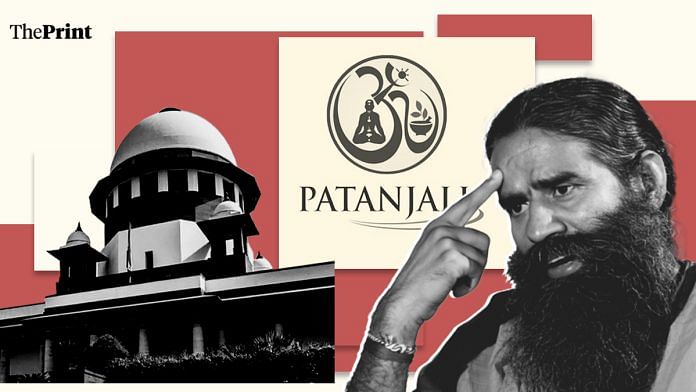New Delhi: The Supreme Court Tuesday directed television broadcasters and print media to file self-declaration forms assuring that the content displayed in the advertisements they carry conforms to existing laws.
A bench of justices Hima Kohli and Ahsanuddin Amanullah also warned that social media influencers and celebrities will be responsible as well as liable if found endorsing products in a misleading advertisement.
The bench issued these directives during the hearing of a 2022 petition filed by the Indian Medical Association, accusing Patanjali, its founder Baba Ramdev, and co-founder Balkishan of publishing misleading advertisements about objectionable products and denigrating modern medicine in publicity campaigns for them.
“We are of the opinion that the advertisers or the advertising agencies or endorsers are equally responsible for issuing false and misleading advertisements,” the bench said.
“Endorsements by public figures, influencers, celebrities, etc., go a long way in promoting a product, and it is imperative for them to act with responsibility when endorsing any product in the course of advertisements,” it added.
The bench also said its warning to social media influencers and celebrities comes taking into account the Central Consumer Protection Authority (CCPA) guidelines, which require influencers to be transparent about paid endorsements.
In February this year, the apex court threatened Patanjali with contempt action after it violated an undertaking of not advertising its objectionable products. Since then, the company has tendered an unconditional apology and followed it up with advertisements in the national media apologising to the public for promoting products barred under The Drugs and Magic Remedies (Objectionable Advertisements) Act, 1954.
In its latest hearing Tuesday, the bench expanded the scope of the case, saying it would bring the operations of fast-moving consumer goods (FMCGs) under judicial scrutiny. It also issued a notice to the IMA for making statements against its view that there needs to be regulation for modern medicine doctors, too.
Taking forward its proposal to stop the FMCGs from broadcasting false declarations about their products, the court passed an interim “tide-over” order to TV broadcasters and print media to file self-declaration forms. The court said through the forms, the broadcasters and publishers would undertake to conform to the Cable Television Networks Rules of 1994 and the advertising code of the Union Ministry of Information and Broadcasting (I&B) before carrying the advertisements.
The forms will be on the Broadcast Seva portal, run by the Union I&B ministry. According to the court order, the government should ensure those filing the forms do not face red tape. “We don’t want to make it difficult for advertisers to advertise. We only want to make sure there is responsibility,” the bench said.
It also ordered the Central government to establish an exclusive portal within four weeks for the submission of the self-declaration forms. It fixed 14 May to hear the matter again.
Also read: Big courtroom that can fit ’13-judge bench’, waiting area for litigants — SC makeover in works
Word of warning for influencers
On the role of influencers, the bench observed: “They have to take responsibility for advertisements as contemplated in guideline 8 (advertisements that target or use children) and guideline 12 (duties of manufacturers, service providers and ad agency) to ensure that the trust of the consumer is not abused or exploited due to sheer lack of knowledge or experience.”
“Guideline 13 requires due responsibility to be taken for advertisements and requires a person who endorses a product to have adequate information or experience with the specific food product to be endorsed, and it must be ensured that it is not deceptive,” it added.
These guidelines, the court added, are meant to ensure that consumers are aware of products purchased from the market, particularly in the health and food sectors.
In the same hearing, the bench objected to the running advertisements of Patanjali products despite their suspension by the Uttarakhand licensing authority. The judges sought an answer from the state counsel, who assured the court of action to ensure the advertisements do not continue.
The court flagged that Patanjali collaborated with media channels that still run the advertisements with company statements and assurances to the public about the products.
It also told the state government that the suspended products should be on hold and cannot be sold in markets.
“Suspended means it is out,” the judges told the state’s lawyer, Vanshaja Shukla. The state need not wait for the court’s prodding, they added.
“This is what is bothering (us); you did not ask them to withdraw (advertisements),” the judges told Shukla.
Meanwhile, the Centre assured the court that it would “forthwith” withdraw the letter issued by the AYUSH ministry to all state authorities asking them to stop action against advertisements for ayurvedic and ayush products under Rules 170 of the Drugs and Cosmetic Rules of 1945.
Rule 170 prohibits advertisements of any ayurvedic, siddha, or unani drugs without the approval of licensing authorities.
In August last year, the AYUSH ministry asked the state licensing authority not to invoke Rule 170 through an executive order without any notification. The move followed the initiation of judicial proceedings challenging the validity of Rule 170 in different high courts.
On Tuesday, the bench disapproved the procedure of suspending the rule, saying when the high courts were looking into the matter, the Centre should not have “jumped the gun”. Moreover, it noted that there was no official decision in the form of a notification to withdraw the rule.
“If any high court feels that a regulation has to be kept in abeyance, it will take a moment for it to pass an order after hearing the parties,” the judges added.
(Edited by Madhurita Goswami)
Also read: SC sets aside NGT restraint on Shimla development plan — ‘environmental aspects taken care of’



